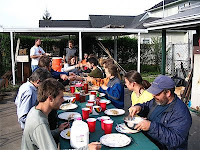I'm a bit of a computer junkie, I will admit. I can write my own html tags in my blog, I know how to create formulas in an excel spreadsheet, and give me five minutes and a search engine and I will answer your question. I am not a computer professional (that's M), but I use computers at a professional level in my work.
Nobody taught me these skills. I never took a class. As far as I recall, we didn't even have the internet in high school, and my first email account was set up when I went to college. Computer usage is a little like reading...the more you do it, the better at it you get, and there's really no other way to get better. You must browse and stumble, and sometimes barely understand what you are doing, but just keep doing it.
So I was a little blindsided by the comments from my classmates last night during a discussion of the Atlantic article Is Google Making Us Stupid? My classmates are all teachers, mostly under 30, and seemed to have a rather polarized view of the world of print media vs. digital media. Print media seemed to fall under the category of Things Much Smarter People Read and digital media under The Reason Kids Have Short Attention Spans and Possibly the End of Literate Society as We Know It.
Now, schools are often horribly underfunded in the area of technology, so there is a very good reason why teachers do not feel comfortable using them...they often get 30 minutes every other week in an aging computer lab, and that's it. But I expected more from the under 30 crowd. Haven't they all been online for a decade? Don't they all own a computer?
The Atlantic article was not so much about Google dumbing us down, as it was about Google altering the way that we read and interact with text. As one of the few rational classmates put it, "We all resist change. Even Socrates did not want to write his ideas down, as he believed in the superiority of the oral argument." Hmmm. Socrates. He was smart, right?
Anyway, my point is that the internet has changed the way we think and read and argue. It has vastly increased the body of knowledge we have access to. This increase in information requires us to be even more discerning.
One of the teachers in my class said that she thought the internet caused students to be less interested in reading good old fashioned books. Funny...because the internet is how I FIND books to read...book lists and recommendations and author sites, and even down to how to get my hands on a hard-to-find, out of print book. Another concern was that the internet limited or controlled the interests of students. My counter argument to that point is M and the topic on his mind this morning. Here is what we searched for: "how to brine ferment sweet peppers". Yesterday it was "ukelele chords". You really don't get much more interesting that M, and the internet has certainly facilitated many of his projects and interests.
Another student objected to the quality of sources on the internet, saying that "things like Google are free, but you have to pay for real newspapers, which have the better quality information." It's true, some newspapers like the Wall Street Journal require a subscription. But I read BBC and the New York Times almost every day, and most of their features are free. And for the record, Google doesn't make anything up. It is a SEARCH ENGINE. It looks for stuff that matches the phrase you type in. Articles from major, reputable newspapers come up in my searches all the time.
I also learned that it is a common school policy to require students to use .edu or .org websites and they are not permitted to use .com websites. This rule was clearly made up by an English teacher who didn't know anything about domain registration. Anybody, regardless of motive can buy and set up a website with .com, .net. or .org. ORG even urges commercial businesses to get a .org:
"Commercial businesses also benefit. Registering a .ORG lends credibility to the activities of a charitable arm, protects your brand name registered with other TLDs and gives customers another path to your website."
I guess my point is that, aside from hearing some opinions that differed quite a bit from my own, my classmates' arguments were based on facts that are Just Plain Wrong, and showed me that despite the fact these people can't put down their iPhones for the duration of class, they probably aren't using the internet for much more than Facebook and email.
Print media is not dead, and schools should continue to teach it. But when our students grow up and enter the work force, it might just be a little better for them to be able to format an excel spreadsheet or use a search engine while working on a project or update their departmental website. Schools need to step up and start teaching these skills. Teachers need to stop fearing this evolution of literacy. Schools of Education need to start creating coursework to teach teachers how to do this. And the public needs to start getting serious about funding our schools in a more 21st century way.










